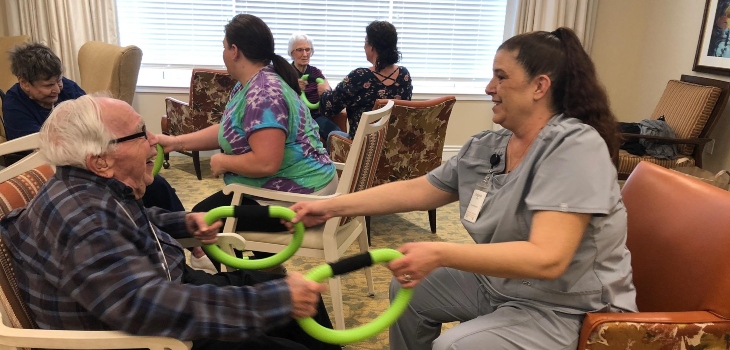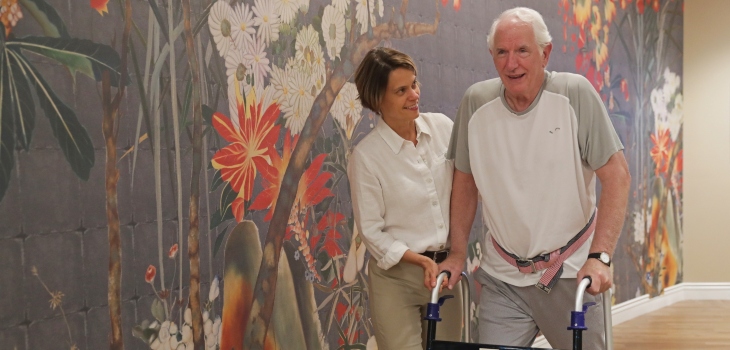From independent living at The Manor House to assisted living and memory care at Linden House, Branchlands Senior Living offers a continuum of care that allows residents to stay within the community as their needs change.
What are the different types of senior care?
When it’s time to make a move, the variety of senior care options available can be daunting. How does a nursing home differ from an assisted living community? What does independent living offer? Clearly understanding each classification of care makes it possible to make a confident decision.
At any stage, a physician may assess physical and cognitive capacity and emotional condition. Individuals and families may turn to a Certified Senior Advisor or Geriatric Care Managers (GCM) to explore care options. Some GCMs can also develop comprehensive care plans as well as assist with benefits enrollment.
Independent Living
At one end of the fifty-five plus care spectrum is independent living in a community like Branchlands where apartment rent in The Manor House includes chef-prepared meals, housekeeping, an extensive and varied activities calendar, local transportation and more. Residents enjoy the privacy of their own place balanced with planned activities and opportunities to socialize. Comfortable accommodations and friendly, professional service help residents to feel at home.
Skilled Nursing Facilities
Sometimes a medical emergency, illness, or hospitalization will result in a lifelong need for nursing services. Nursing homes may also provide post-surgical care for individuals who cannot manage recuperation at home. In general, a move to a nursing home is rarely a choice, but rather a clear necessity.
Home Health
Family members often provide capable senior care at home. But caregiving is stressful and physically demanding, and some seniors do not wish to place an undue burden on their family. Hourly paid homecare is another option. Even with daily help, however, seniors “aging in place” often become disengaged and lonely as their network diminishes. As social isolation is a significant risk factor, it can be a compelling reason for a move to assisted living. In the best-case scenario, a person recognizes that he/she needs help, decides the time has come to move, and actively participates in selecting where she will live.
Assisted Living
With gradual decline, the decisions around care are more complex. Nearby family may only notice changes over time. Family members who live at a distance may be alarmed when they visit. Troubling signs include decreasing mobility, poor nutritional choices, incontinence, medication mix-ups (along with falls, a major cause of hospitalization), or other lapses in self-care. Someone may not be a candidate for a nursing home but does need day-to-day assistance to stay safe and healthy.
Assisted living communities serve people who remain active but cannot or choose not to live independently because of medical or physical limitations. Staff is on hand for the help with activities of daily living (ADL), such as bathing, dressing, administering medications, etc.

Senior Care and Services at Linden House Assisted Living
In an assisted living community, residents partake of all that they enjoyed doing when they were living independently with the assurance that medically qualified staff are on call—a variation of independent living, only with benefits!
When a resident first comes to Linden House, the staff, resident, and family establish a Comprehensive Care Plan.
At Linden House Assisted Living and Memory Care, we greatly value an individual’s happiness and a family’s peace of mind. We ask for a medical history and results from a recent physical examination. Following a physician’s recommendations and in close consultation with the resident and family, we compile safety, nutritional, and social requirements and preferences into a comprehensive care plan. Our electronic charting system records this information, along with medication instructions.
On admission, we also conduct a wellness and mobility assessment and review fall and wound history to determine an individual’s self-help capabilities. When there is an indication of Alzheimer’s disease or condition causing memory loss, we conduct a cognitive assessment using the Reisberg Scale (also known as the Global Deterioration Scale for Assessment of Primary Degenerative Dementia or GDS).
Medical assistance is always at hand.
What differentiates Linden House from other assisted living facilities is the 24/7 nursing aides who oversee wellness, administer medications, and assist in medical emergencies. Registered Nurses are also on hand Monday through Friday from 9-5. By getting to know all residents and seeing them day to day, they stay attuned to changes that call for a reassessment and medical consultation. We contact family members about changes in a resident’s condition as soon as possible. Team members may also readminister the GDS test to assess cognitive decline.
While not a skilled nursing facility, Linden House offers health-related services above and beyond what is required by its licensing agency, the Virginia Department of Social Services. All day, evening, and weekend supervisors are Licensed Practical Nurses (LPNs). Under the direction of a physician, they monitor vital signs, administer medications, and provide activities of daily living (ADL) assistance. An Activities Director provides physical fitness classes and instruction. Genesis Rehab offers onsite occupational and physical therapy to residents and individuals from the larger community. While residents may choose to use the services of external home health and hospice organizations, in-house staff is prepared and stands ready to meet these needs.
On-site clinic and concierge transportation make health appointments more convenient.
Acting as a liaison with the family and primary care provider, our nurses can arrange for an appointment or adjust medications and care protocols as the physician directs. Linden House’s concierge services include free transportation to medical appointments as well as local shops, entertainment, and restaurants; however, the family is responsible for making arrangements when an individual needs to be accompanied or assisted.
Residents may choose to continue to see their personal physician who is welcome to use our on-site clinic. In addition, we work closely with the University of Virginia Medical Center’s geriatric specialists and can schedule home health visits with the geriatric nurse practitioner for those residents who elect one of these geriatricians as a primary care provider. All results, decisions, and change orders are recorded on the electronic charting system.
As medical issues arise, qualified staff administer immediate aid.
In the event of medical emergency, staff calls 911 and, until the rescue squad arrives, administers the level of aid for which they are certified. Because transitions, such as making a trip to the emergency room, can distress residents with cognitive impairments, our staff confers closely with emergency responders to determine if the move is necessary or if on-site care is preferable. Our compassionate nursing staff operates by the principles of acting promptly, responding professionally, and never causing harm.
The Gardens offers specialized care for individuals with Alzheimer’s and other memory impairments.
The Gardens at Linden House is dedicated to residents with Alzheimer’s or other cognitive challenges. Within The Gardens, eight residents live in one of three “neighborhoods”. Each neighborhood simulates a homelike environment, with private, spacious ensuite bedrooms opening to a kitchen, dining area, and living room. The Gardens also offers a lovely small enclosed outside area. Walking through a neighborhood, one might find residents dancing, baking cookies, or enjoying animal therapy. Trained in Teepa Snow’s ‘Positive Approach to Care’, staff attend to emotional, social, and physical needs of The Gardens residents.
The Care Plan becomes the staff’s “playbook” for all medical, housekeeping, pet care, nutrition, and other preferences.
The care plan also includes details of day-to-day living. Does the resident need assistance with laundry? Will the resident or a staff member walk the dog or clean the cat’s litter box? Will the resident wish to use the services of the in-house hair and nail salon? Optional laundry, pet care, beautician, and other similar services are available for a fee.
Healthy living starts with healthy meals. The care plan specifies dietary preferences, requirements, and restrictions. In addition to a regular menu, Linden House’s chef prepares a low concentrated sweets menu for diabetics and a modified textures diet for individuals with dysphagia or other difficulties swallowing. (Regardless of diet, ingredients are fresh; recipes are delicious; menus are imaginative; and presentation is beautiful.) Dietary specifications are also recorded and monitored within the electronic charting system.
To be sure all is at it should be, we revisit the plan with the resident and family a week after move-in. As the resident settles in, staff has had an opportunity to assess how the plan is working and whether there are needs that were not initially identified. Some issues may be short term as the transition itself can be unsettling. Others may require ongoing discussion with family members who sometimes have overestimated physical capabilities.
All along, to be sure we are meeting expectations, we welcome input and suggestions. We want residents and their families to remain engaged and to know they have been heard and that we have responded promptly and to their satisfaction.

People make all the difference
While the care plan ensures each resident receives the attentive and personalized care they want and need, it is the people who make residents feel at home. While physical well-being is of paramount importance, a critical dimension of qualify of life is the personal touch. Our staff understands the importance of making sure each new resident feels welcomed.
We value each person’s unique perspectives and life experiences and want to get to know them well. Did they have a career? What about family? What are their interests? These life stories enrich the resident-caregiver relationship which, over time, often becomes a close bond. We always seek to live up to the assessment of one online reviewer, “Linden House is a wonderful caring community.”
No doubt, health and wellness considerations are paramount in choosing a care community. Ambiance and amenities are extremely important. But a person’s quality of life in assisted living revolves largely around the expertise, kindness, and responsiveness of the individuals who work there. Residents often form close bonds with staff they see day-in day-out. When you come to visit, ask a nurse why she chooses to work at Linden House. When she talks about the mutually enriching relationships she enjoys with residents, you know you’ve come to a place where residents truly “live life to the fullest”.
Find the level of senior care that’s right for you: learn more about Branchlands’ independent living and assisted living communities.
